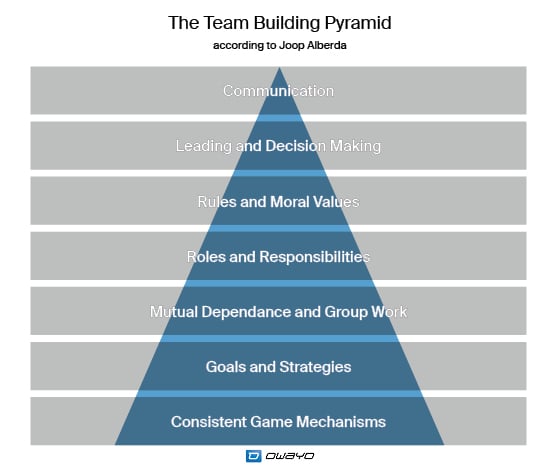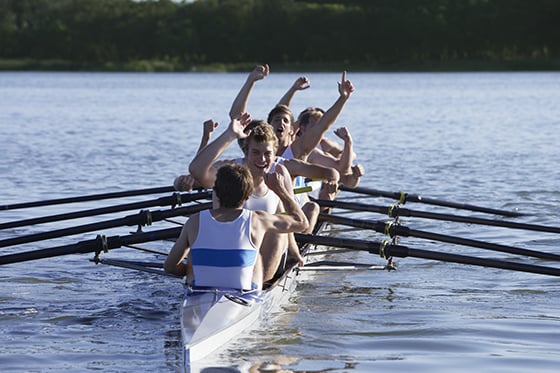Successful team building: how to motivate your team
Interview with sports psychologist and team coach Markus Flemming

Cohesion plays a decisive role in every team, because it has a great influence on motivation and thus on the success of the team. Sports psychologist and team coach Markus Flemming reveals in an interview why team spirit is so important and what helps to strengthen a sense of togetherness and team spirit and motivate the team.
A wide variety of sports can only function in a closely-knit team: be it volleyball, esports or running teams. In addition to good technique, strategy and fitness, it is always the interaction of the individual team members that determines whether the team enjoys the game and success - or not.
Below you will find all important information about motivation in sport taken from technical literature. Expert Markus Flemming also has his say.
What makes a good team?
For a team to function well, various aspects must be taken in consideration. Among others, sports psychologist Lothar Linz and former coach of the Dutch national volleyball team Joop Alberda have dealt with this topic. Here we explain to you what they think makes a motivated team.
Group rules according to Lothar Linz
In his book "Erfolgreiches Teamcoaching" (which means "successful teamcoaching", published by Philippka-Sportverlag in 2014), sports psychologist and coach Lothar Linz summarises the most important rules of team life.
- "Right to Belong": by joining a team, the player has an (unspoken) right to belong. He sees himself as part of the team and is involved in all aspects of the team. If, however, a player is excluded from the team without a valid reason - such as breaching the rules or leaving the club - this has a negative effect on the feeling of belonging to the group.
- "Right of Priority": in the team, each player takes on their individual role. The coach must therefore accept specific roles and rights too (e.g. due to older age or longer membership in the club) and should not try to treat all players equally.
- "Balancing giving and taking": the high commitment of a player should also be valued as such. There can be problems if giving and taking are not balanced, for example, if a player often misses training, but then wants to be in the initial line-up for a match.
- "The group is more important than the individual member": a common goal and clear rules for living together are important for each team. This includes, for example, punctuality or the dress code on match day. If players do not follow these rules, they must expect a penalty. Such rules make it clear that the well-being of the group takes precedence over that of the individual. It can be problematic if players no longer want to subordinate themselves to these rules of conduct, for example because they want to perform outstandingly or rebel against the coach.
- "Everyone influences everyone": it must be clear to the team that each individual contributes to the success of the group. If a player makes a big mistake, this can lead to the defeat of the whole team. But also, the outstanding performance of an individual can lead to success. Therefore, every member of a team is important.
- "The whole is more than the sum of its parts": the better a team works together, the more it can achieve. The team spirit and the cooperation of the individual players is therefore decisive. If a team does not stick together or if it forms small groups, its performance will be weakened.
- Group-specific rules: in addition to adhering to the rules and norms, it is important that the individual players can also identify with the values and goals of the team. Therefore the team members have to agree to the basic values of the team.
If all members of the team have internalized these group rules equally, great cohesion and motivation can develop. In addition to these group rules, a team, according to Lothar Linz, always needs a good leader who sets the direction of the group. Because without guidance, it is not possible for a group to reach its goal. It is therefore important that the trainer perceives his leadership position by making decisions and taking responsibility for the group.

Team-building pyramid according to Joop Alberda
Former Dutch national volleyball coach Joop Alberda has also been involved with teams and the principles of team building. He explains them by using a pyramid: at the top is communication, which must emanate from the coach. He is also responsible for leading and making decisions, and takes main responsibility for the team. According to Alberda, the joint development of rules, goals and strategies as well as the identification of all players with them are also important in order to motivate the team in the long term.
The following infographics show you exactly how the team-building pyramid is structured and what other aspects according to Alberda are important for a good team spirit and how they build on each other.

Practical tips from experts: communication as a success factor for motivation in sport
Every single player in a team must be able to rely on their teammates at all times. Therefore, it is particularly important for coaches of team sports to strengthen the team spirit and to pursue targeted team building. Sports psychologist and team coach Markus Flemming tells us in an interview what is important - and what opportunities there are for the coach and the members of the team to build a satisfied group with a strong sense of belonging.

The expert: Markus Flemming
As an independent psychologist, Markus Flemming (keep clicking on the right arrow in the team section) specializes in sports psychology, mental training, team building and failure management. He has been working as a freelance sports psychologist for top athletes since 2005. Since then, he has coached the German national basketball team, the German national archery team, the former German hockey champions "Eisbären Berlin", as well as individual top athletes.
Importance of team building for the team spirit
Targeted team building makes sense for every team. Especially at the beginning of the season and before the most important moments of the season, it is important to bring the team together and talk to each other, explains sports psychologist Markus Flemming.
"It helps all players enormously, especially at the beginning of the new season, to consciously take time and get to know each other in a common round, to communicate with each other and to agree on common rules and goals. If there is a new coach, he should introduce himself to the team and show interest in his team. On this occasion, the team members can communicate and become conscious about the strengths and weaknesses of individuals too."
To do so, for example, the team can carry out activities together, such as go climbing or hiking together a weekend. But even if the financial means for such a team event are not available, the expert recommends taking the time to get together to talk.
"It could also be a tournament, a barbecue or even going to the theatre. The essential thing is to sit down afterwards, talk to each other and work out the values, goals and rules together. This is a very important process for every team."

The trainer's role
The trainer must be a leader for his team, similar to a leader in a company. However, he should always try to involve all team members in the process, explains Markus Flemming.
"In addition to the leadership role, the coach must be able to moderate, to be responsive to all team members and thus build trust between players too. Only with trust can self-confidence develop. This is the only way for a trainer to be able to ensure that everyone can continue to pull together and that each can rely on the other, even in times when things are not going so well."
Regular communication to strengthen team spirit
According to the team coach, communication, especially between coaches and team members, should not only take place at the beginning, but on a regular basis.
"A good coach constantly looks for communication with the players and, for example, asks how their family members are doing or what other interests they have besides sport. The honest and sincere interest of the coach is essential. If a trainer is really concerned with his team, it shows real appreciation. Only this way can true confidence and 'Commitment' develop in individual members.

Identifying and handling problems
Problems can occur with any team, whether in a hobby sports team or in competitive sports. This is quite normal, explains Markus Flemming.
"It would be a lie if everyone in every team was the best of friends. After all, everyone is different and even as a coach you can't look anybody in the eye and know exactly what's really going on with them. The point, however, is that you manage to get individual personalities to cooperate and to integrate them firmly into the long-term process of team building. Friction can also be an advantage in this process, because it is also energy. It is important that the long-term, overriding goal is of equal interest to all."
As a coach, if you notice that a player, for example, is not particularly good or is unmotivated, you should first ask yourself what the reason is.
"The easiest way, of course, is to tell the player to leave the team. In some cases, this can happen. However, as the leader of a team, you always have the option to ask what's wrong: there are often fears that the player has, an inner blockade or even a role in the group with which he cannot identify. You should first try to find that out - and that happens via communication, in individual conversations. This is why it is so important for trainers to keep in touch with their players. Then, you can try to work together on the situation."

The team members' role
Team members can also actively contribute to a stronger sense of community within the group, says Markus Flemming.
"It is important that the players actively participate in projects and recognise and understand their own role in the team. Because in each team there are different roles - that is how it is, whether you're in the office or in a sports team. High-level personnel should also cooperate and help the players better understand these roles. If one can identify oneself as a player with their own role and identify common values, symbols, rules and goals of the team, one also has fun to be part of it. You are motivated to work for the team."
Motivating your team: applying suitable training measures
There are several specifically designed exercises that you can do with your team to build trust among each other. It is easy to include it in your basketball training session or football training. You can watch a team building exercise by soccer club FC Hansa in the following video.
During training camp, instead of playing soccer, the team was given the task of climbing a mountain alternately by bike or on foot within 45 minutes using a map. The reason? Communication and coordination between the players was crucial.
Many other team building exercises for teams of all kinds can be found quickly, for example, by searching the Internet. But it can be difficult to motivate a large team to actively participate in the exercise, sports psychologist Markus Flemming points out.
"Particularly in large teams, motivation to participate in such exercises can be low and may pose a challenge for the trainer. However, working with extrinsic rewards may help. If team members feel obligated to participate in a certain way, if they get some sort of reward, their motivation may increase. With moderation, the coach should try then to attach intrinsic motivation to the exercise and make sure team members feel it, so that they want to take the initiative themselves in the future."
One speaks of extrinsic motivation when the motivational drive is triggered by an external stimulus, for example when a reward, such as money or recognition, leads to motivation. In contrast, intrinsic motivation is the motivation that arises from within, of its own accord.
Promoting motivation in sport
Markus Flemming advises the following if you have questions about further tips to promote motivation in a team.
"No matter what kind of team it is, it is important to get together, to be human and to let be human. You should never forget that. This means, for example, that you also share personal matters, concerns or fears and talk about them. Only by thinking about and talking about situations that could become stressful, for example, can you recognise that, even in the worst case, you still have resources and possibilities to continue to act successfully together in the team. Because, at the end of the day, everyone in the team, including the manager, is only a person - and we should allow that to happen."
We would like to thank Markus Flemming for the detailed interview.
Tips: how to create a strong team spirit
As a coach, what can you do to strengthen the team spirit of your team members? We have summarised the recommendations from the interview:
- Introduce yourself: if you are a new coach in a team, it is important that you introduce yourself to the whole team and express your interest in the team.
- Gather your team together: provide a framework where your entire team can really get to know each other. For example, organise a common leisure time, a barbecue evening or go to the cinema together. In this way, you create opportunities for the team to exchange ideas and get to know each other better in private.
- Agree on common goals and rules: it is very important to agree on common values, rules and goals that all team members share. Sit down together and discuss what is important to the players for the team. It is important that all team members can be equally involved. Record the results in writing, for example on a board.
- Listen to the players: get to know your team and always have an open ear for every player. This is the only way you can recognise fears and problems of the individual early on and then act when needed.
- In case of problems, proactively approach the players: if you notice that a player is not performing as expected or is somewhat depressed, approach him. Show him that you are there for him when he wants to talk.
- Share private stuff too: if a team member has problems, it's not always about the game or the team. It is therefore important to get to know and accept the players as people. By sharing personal things with the team, you can create real trust between each other. Allow your players to have their concerns and fears and talk to them even if they have private worries.
- Moderate if problems arise between players: if necessary, you should be able to moderate between players. In an open discussion, talk to all team members and let everyone have their say.
Further team-building measures
Do you now want to actively strengthen your team spirit? With our expert tips for team building, you are guaranteed to provide the right amount of motivation. A unique and suitable team name for your group or a very individual team jersey can also contribute to the sense of community.
Our tip: with our 3D Designer, you can develop your own cool design. In our Online Shop you will find a large selection of jerseys for athletes of various sports, which can be individually designed.
In our Magazine, you will also find further exciting information and tips such as Mental Training in Sports. We hope you enjoy reading our articles!
Photo credits: Title of the picture: ©gettyimages/fstop123, Picture 1: © gettyimages/Chris Ryan, Picture 2: © owayo, Picture 3: © Markus Flemming, Picture 4: © gettyimages/Chris Ryan, Picture 5: © gettyimages/Wavebreakmedia, Picture 6: © gettyimages/SARINYAPINNGAM.